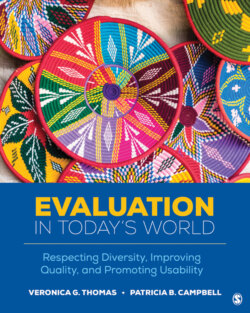Читать книгу Evaluation in Today’s World - Veronica G. Thomas - Страница 98
На сайте Литреса книга снята с продажи.
Evaluation Corruptibility and Fallacies
ОглавлениеIt is often said by numerous scholars and practitioners in the evaluation community that “evaluators must be able to speak truth to power.” Evaluation corruptibility and evaluation fallacies are two factors that can put an evaluator at risk of unethical decision making, jeopardizing evaluation quality, and, thus, an inability to “speak truth to power.” Fitzpatrick, Sanders, and Worthen (2004) use the term evaluation corruptibility to describe ways that evaluators may be convinced to go against ethical standards, thus engaging in ethical compromises or distortions. They point to five specific areas of evaluation corruptibility (Fitzpatrick et al., 2004, pp. 423–424):
Conflict of interest: a willingness to twist the truth and produce positive findings due to conflict of interest or other perceived payoffs or penalties (such willingness may be conscious or unconscious)
Unsubstantiated opinions: an intrusion of unsubstantiated opinions because of sloppy, capricious, and unprofessional evaluation practices
Prejudices and biases: “shaded” evaluation “findings” as a result of intrusion of the evaluator’s personal prejudices or preconceived notions
Inducements: obtaining the cooperation of clients or participants by making promises that cannot be kept
Not honoring commitments: failing to honor commitments that could have been honored
To avoid corruptibility, evaluators must be transparent and disclose any relationships (e.g., previous organizational ties or ties with program staff) that might predispose them to bias or give the appearance of bias. Further, they should in no way profit from the outcome of an evaluation. Familiarity with and adoption of the Evaluators’ Ethical Guiding Principles and the Program Evaluation Standards can provide much-needed guidance for dealing openly with situations that can impact ethical decision making and quality evaluations.
House (1995) considered the issue of evaluator corruptibility from a different perspective than Fitzpatrick et al. (2004). He suggested that evaluators can have the best intentions and may not be corrupt, per se, but, at times, may have a misunderstanding about their responsibilities. House referred to these misunderstandings as evaluation fallacies. A fallacy is a mistaken belief based on unsound argument deriving from reasoning that is logically inaccurate. House (1995, pp. 29–30) identified five evaluation fallacies that can have negative ethical consequences:
Clientism: the fallacy that doing whatever the client requests or whatever will benefit the client is ethically correct
Contractualism: the fallacy that the evaluator must follow the written contract without question, even if doing so is detrimental to the public good
Methodologicalism: the belief that following acceptable inquiry methods ensures that the behavior of the evaluator will be ethical, even when some methodologies may actually compound the evaluator’s ethical dilemmas
Relativism: the fallacy that opinion data the evaluator collects from various participants must be given equal weight, as if there is no basis of appropriately giving less priority to the opinions of peripheral groups than to those of more pivotal groups
Pluralism/elitism: the fallacy of allowing powerful voices to be given higher priority because the evaluator feels they hold more prestige and potency than the powerless or voiceless
